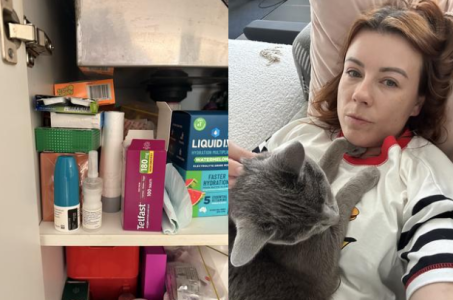Urgent health alert! THIS common spray worsening night-time breathing problems
By
Maan
- Replies 0
A common household product has left some Australians feeling trapped in a cycle they never expected.
What starts as instant relief can spiral into restless nights, mounting anxiety, and a desperate search for the next dose.
For some, it is not drugs or alcohol—just a simple over-the-counter spray.
When Rebekah Scanlan brought home her Russian Blue cat, Miki, in January 2022, she knew her allergies would flare.
Sneezing, red eyes, and constant discomfort followed, but her need for companionship after two years of Covid isolation outweighed logic.
Within days, even daily antihistamines were no match for her symptoms.
A pharmacist suggested a nasal decongestant spray with one warning: ‘Don’t use it for more than three days in a row.’
The relief was immediate, and soon Rebekah was reaching for the spray multiple times a day.
She ignored the caution, believing something so simple could do little harm.
That belief crumbled during her first overnight stay at her boyfriend’s house.
She had left the spray at home, and as soon as she lay down, her body panicked.
Her nose blocked, her breathing became laboured, and anxiety surged as she realised she could not sleep without it.
‘I’m addicted to my nasal spray,’ she confessed the next morning.
‘I can’t breathe without it.’
Her frantic search for answers led her to Google, where she discovered a name for her condition—rhinitis medicamentosa.
Dr Zac Turner, a Sydney-based biomedical scientist and doctor, explained that overusing sprays can trigger rebound congestion.
‘Basically, your nose throws a tantrum and refuses to breathe without its “fix”,’ he shared.
Most sprays contain oxymetazoline, xylometazoline, or phenylephrine, which shrink blood vessels in the nasal lining.
Once the effect wears off, the body overcompensates by sending more blood to the area, leaving the nose even more congested.
This sets up a dependency cycle—relief followed by worsening symptoms.
‘Nasal sprays are a fling, not a long-term relationship, three to five days max,’ Dr Zac warned.
He recommended saline rinses, steroid sprays, and GP support to ease withdrawal, along with directly treating allergies.
The withdrawal process, however, was anything but easy.
Rebekah described the first week as miserable—sleepless nights, relentless congestion, and constant anxiety about her breathing.
Others online compared it to going ‘cold turkey’, with one woman saying it felt like she wanted to pull her nose off.
Despite the struggles, she persevered, and after six months, she was finally free from the spray.
Her allergies improved over time, though she admitted she still keeps a few bottles hidden around her home.
‘People might say I’m insane putting myself through six months of hell for a cat,’ she reflected, ‘but when he curls up on my lap each night, I know the difficult journey was so worth it.’
Breathing issues aren’t the only health risks linked to everyday medicines in the home.
Sometimes, even products we trust for relief can have dangerous and unexpected consequences.
One recent case highlights just how serious things can become when an over-the-counter remedy goes wrong.
Read more: Is your cold medicine safe? Shocking death sparks urgent health warning you can't ignore!

Would you risk months of discomfort just to breathe easily again—or to keep the pet you love?
What starts as instant relief can spiral into restless nights, mounting anxiety, and a desperate search for the next dose.
For some, it is not drugs or alcohol—just a simple over-the-counter spray.
When Rebekah Scanlan brought home her Russian Blue cat, Miki, in January 2022, she knew her allergies would flare.
Sneezing, red eyes, and constant discomfort followed, but her need for companionship after two years of Covid isolation outweighed logic.
Within days, even daily antihistamines were no match for her symptoms.
A pharmacist suggested a nasal decongestant spray with one warning: ‘Don’t use it for more than three days in a row.’
The relief was immediate, and soon Rebekah was reaching for the spray multiple times a day.
She ignored the caution, believing something so simple could do little harm.
That belief crumbled during her first overnight stay at her boyfriend’s house.
She had left the spray at home, and as soon as she lay down, her body panicked.
Her nose blocked, her breathing became laboured, and anxiety surged as she realised she could not sleep without it.
‘I’m addicted to my nasal spray,’ she confessed the next morning.
‘I can’t breathe without it.’
Her frantic search for answers led her to Google, where she discovered a name for her condition—rhinitis medicamentosa.
Dr Zac Turner, a Sydney-based biomedical scientist and doctor, explained that overusing sprays can trigger rebound congestion.
‘Basically, your nose throws a tantrum and refuses to breathe without its “fix”,’ he shared.
Most sprays contain oxymetazoline, xylometazoline, or phenylephrine, which shrink blood vessels in the nasal lining.
Once the effect wears off, the body overcompensates by sending more blood to the area, leaving the nose even more congested.
This sets up a dependency cycle—relief followed by worsening symptoms.
‘Nasal sprays are a fling, not a long-term relationship, three to five days max,’ Dr Zac warned.
He recommended saline rinses, steroid sprays, and GP support to ease withdrawal, along with directly treating allergies.
The withdrawal process, however, was anything but easy.
Rebekah described the first week as miserable—sleepless nights, relentless congestion, and constant anxiety about her breathing.
Others online compared it to going ‘cold turkey’, with one woman saying it felt like she wanted to pull her nose off.
Despite the struggles, she persevered, and after six months, she was finally free from the spray.
Her allergies improved over time, though she admitted she still keeps a few bottles hidden around her home.
‘People might say I’m insane putting myself through six months of hell for a cat,’ she reflected, ‘but when he curls up on my lap each night, I know the difficult journey was so worth it.’
Breathing issues aren’t the only health risks linked to everyday medicines in the home.
Sometimes, even products we trust for relief can have dangerous and unexpected consequences.
One recent case highlights just how serious things can become when an over-the-counter remedy goes wrong.
Read more: Is your cold medicine safe? Shocking death sparks urgent health warning you can't ignore!
Key Takeaways
- Overusing nasal sprays can trigger rhinitis medicamentosa, leading to rebound congestion.
- Many Australians may be at risk, with almost one in four experiencing allergic rhinitis.
- Doctors advise limiting use of decongestant sprays to three to five days.
- Withdrawal can cause significant discomfort, but symptoms usually improve with persistence and medical support.
Would you risk months of discomfort just to breathe easily again—or to keep the pet you love?








